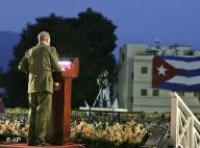Cuban delegation invited to Brussels
The European Union reached out to the new Cuban government, inviting a delegation to Brussels for "open political dialogue".

The EU said the temporary transfer of power from Fidel Castro to his brother Raul the first change of power in 48 years constituted a "new situation" and said it was ready to resume discussion with Cuban authorities on political, human rights and economic issues.
It decided not to reactivate its sanctions against Cuba, which were put on hold in 2005. But it reiterated its call on authorities to release political prisoners and grant freedom of expression and information to Cuban citizens. It also said it would continue its support for dissidents and the civil society.
The EU imposed diplomatic sanctions on Cuba in 2003, after authorities there detained 75 dissidents accused of working with the United States to undermine Fidel Castro's government. Cuban authorities then released 16 for medical reasons, and in January, 2005 the EU suspended the measures, restoring diplomatic relations and scrapping its ban on talks with Cuban officials.
The invitation which the EU said was broadly based and not addressed to any particular individuals is part of the EU's drive to improve relations with Cuba, strained for years over human rights issues.
"We'll see if they show up, and if so, what the talks will bring," Czech Foreign Minister Karel Schwarzenberg said during a meeting of EU foreign ministers.
Spain is leading efforts to improve relations with Havana, while countries such as Britain, the Czech Republic, Poland and Sweden have been more guarded, insisting that the EU only fully normalize its ties with Cuba after civil and political freedoms are granted to all citizens.
The EU is adamant that if the Cubans accept the invitation, they must also agree to discussing human rights, political prisoners and democratization of the island. Equally, the union wants all officials from its member states visiting Cuba to raise these issues with the government.
Many governments and rights organizations around the world accuse Cuba of violating liberties by jailing critics and limiting speech and media freedoms.
The Cuban government rejects those charges, saying it respects human rights more than most nations by offering a wide social safety net that includes free health care. Havana dismisses outspoken critics and dissidents as "mercenaries" of the United States.
It was not immediately clear if Cuba would accept the EU's approach although diplomats said a framework for the visit has already been discussed.
Subscribe to Pravda.Ru Telegram channel, Facebook, RSS!





